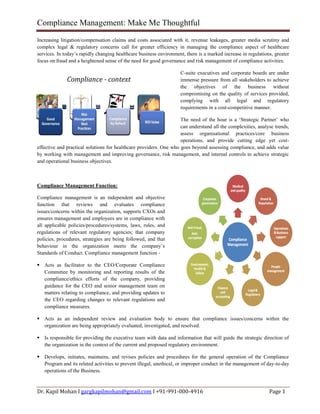Compliance Managment; Make Me Thoughtful - Dr. Kapil Mohan
- 1. Compliance Management: Make Me Thoughtful Dr. Kapil Mohan I gargkapilmohan@gmail.com I +91-991-000-4916 Page 1 Increasing litigation/compensation claims and costs associated with it, revenue leakages, greater media scrutiny and complex legal & regulatory concerns call for greater efficiency in managing the compliance aspect of healthcare services. In todayŌĆÖs rapidly changing healthcare business environment, there is a marked increase in regulations, greater focus on fraud and a heightened sense of the need for good governance and risk management of compliance activities. C-suite executives and corporate boards are under immense pressure from all stakeholders to achieve the objectives of the business without compromising on the quality of services provided, complying with all legal and regulatory requirements in a cost-competitive manner. The need of the hour is a ŌĆśStrategic PartnerŌĆÖ who can understand all the complexities, analyse trends, assess organisational practices/core business operations, and provide cutting edge yet cost- effective and practical solutions for healthcare providers. One who goes beyond assessing compliance, and adds value by working with management and improving governance, risk management, and internal controls to achieve strategic and operational business objectives. Compliance Management Function: Compliance management is an independent and objective function that reviews and evaluates compliance issues/concerns within the organization, supports CXOs and ensures management and employees are in compliance with all applicable policies/procedures/systems, laws, rules, and regulations of relevant regulatory agencies; that company policies, procedures, strategies are being followed, and that behaviour in the organization meets the companyŌĆÖs Standards of Conduct. Compliance management function - ’é¦ Acts as facilitator to the CEO/Corporate Compliance Committee by monitoring and reporting results of the compliance/ethics efforts of the company, providing guidance for the CEO and senior management team on matters relating to compliance, and providing updates to the CEO regarding changes to relevant regulations and compliance measures. ’é¦ Acts as an independent review and evaluation body to ensure that compliance issues/concerns within the organization are being appropriately evaluated, investigated, and resolved. ’é¦ Is responsible for providing the executive team with data and information that will guide the strategic direction of the organization in the context of the current and proposed regulatory environment. ’é¦ Develops, initiates, maintains, and revises policies and procedures for the general operation of the Compliance Program and its related activities to prevent illegal, unethical, or improper conduct in the management of day-to-day operations of the Business. Compliance - context
- 2. Compliance Management: Make Me Thoughtful Dr. Kapil Mohan I gargkapilmohan@gmail.com I +91-991-000-4916 Page 2 A standardized process followed for internal audit and compliance management may consists of: ’é¦ Audit Planning: Quarterly/rolling Audit planning/scheduling. Formulation of audit scope, RACMs, audit programs/checklists/ICQs, Resource planning for audit assignments. ’é¦ Audit Execution: Commencement of audit fieldwork, Coordination with outsourced/co-sourced consultants/auditors, Maintain a robust audit workflow & issue tracking system, and Audit Alert to relevant Functional Head(s). ’é¦ Collaborate and build relationships with leaders across the various functions to review, investigate, resolve and mitigate any potential regulatory or compliance issues. ’é¦ Develop and periodically review and update to management, as directed or requested, to keep the CEO and senior management informed of the operation and progress of compliance efforts. ’é¦ Respond to alleged violations of rules, regulations, policies, procedures, and code of conduct by evaluating or recommending the initiation of investigative procedures. Develop and oversee a system for uniform handling of such violations. ’é¦ Monitor and, as necessary, coordinate with compliance activities of other departments to remain abreast of the status of all compliance activities and to identify trends. ’é¦ Identify potential areas of compliance vulnerability and risk; develop/implement corrective action plans for resolution of problematic issues, and provide general guidance on how to avoid or deal with similar situations in the future. ’é¦ Ensure proper reporting of violations or potential violations to duly authorized enforcement agencies as appropriate and/or required. ’é¦ Team Management, work review/documentation, and knowledge sharing. ’é¦ Share best practice with relevant functional head(s) and process owner(s) to improve the control environment. ’é¦ Implement and manage a ŌĆ£whistle blowerŌĆØ reporting mechanism. ’é¦ Institute and maintain an effective compliance communication program for the organization. ’é¦ Monitor the performance of the Compliance Program and related activities on a continuing basis, taking appropriate steps to improve its effectiveness. Risk-resilient healthcare organisations assume risks profitably while effectively managing the complexities of a rapidly evolving business and regulatory compliance environment. By integrating risk management, internal control and compliance systems, management decisions can be made with increased confidence and clarity. The current business atmosphere of healthcare provider organisations is very complex and competitive. There are pervasive risks in all facets of operations and an increasing amount of regulatory requirements that the organisation must comply with. As management sets objectives and identifies processes, a comprehensive risk assessment, internal audit, and compliance management can help identify risks and prioritise risk responses within operations, as well as identify potential opportunities. This process will allow the organisation to more efficiently determine where resources should be allocated.

